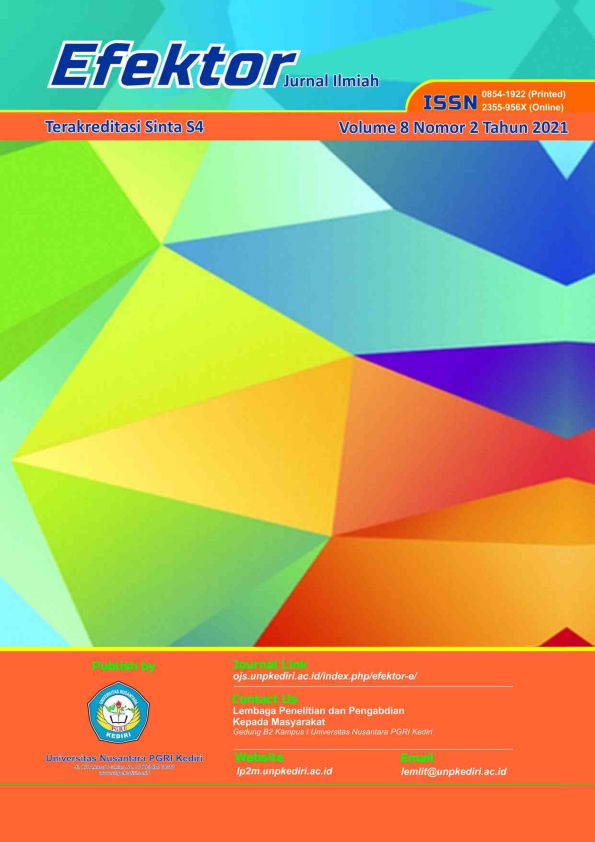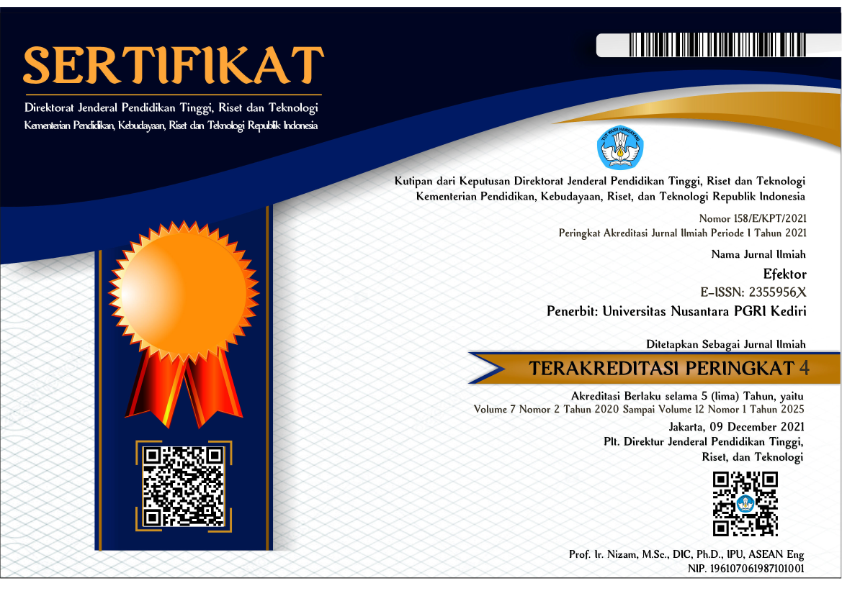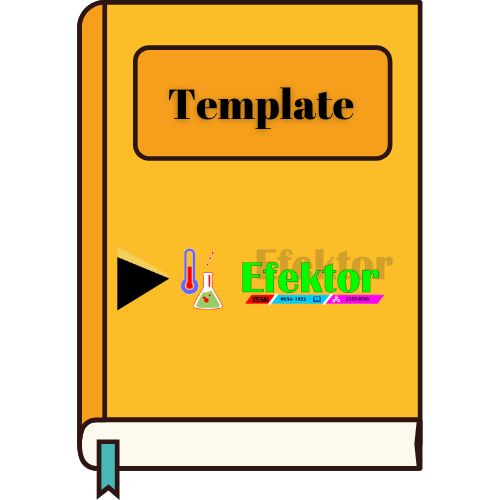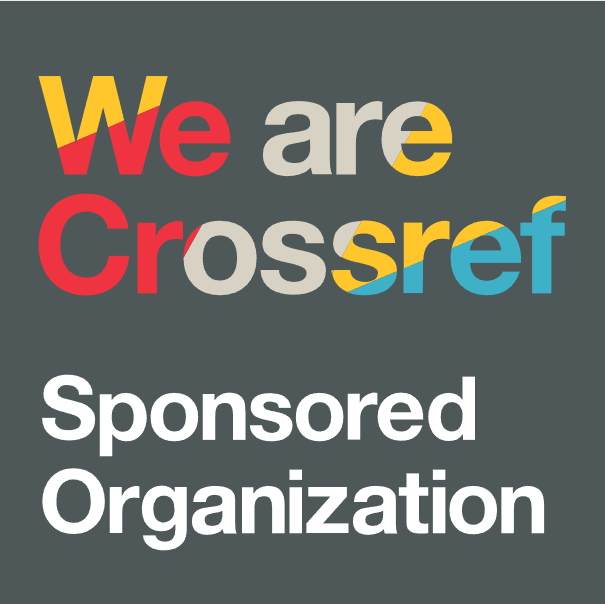DEVELOPMENT OF SCIENTIFIC LITERACY BASED E-WORKSHEET IN SCIENCE LEARNING OF MATERIALS FORCE FOR FOURTH GRADE ELEMENTARY SCHOOL STUDENTS
DOI:
https://doi.org/10.29407/e.v8i2.16207Keywords:
E-workssheet, Scientific Literacy, ForceAbstract
This investigation means to deliver e-student worksheets based on Science Literacy with the content of force for the fourth grade students of primary school. This exploration is a type..of research and development with the ADDIE development model consisting of three.stages including..analysis,..design, and development. The assessment isinvolving material experts, media, linguists, elementary school teachers and students. The data was obtained by observations, interviews and questionnaires. Literacy-based e-student worksheets assessment is in accordance with the right aspects, the right aspects, the right aspects, and the right literacy aspects. The aftereffect of this examination indicate that the e-student worksheets according to Science Literacy is very suitable to be used for fourth grade elementary school students. This is proven based on the assessment by material experts of 96%, linguists 94%, media experts 87%, elementary school teachers get an average rating of 97%, one to one 93%, small group 86%, field test 84% if described including very good category. The implication of implementing e-student worksheet based on Science Literacy can create active, independent and meaningful learning for students, teachers can add new sources of insight, and PGSD students get an idea to conduct similar research.
References
Kasina dan Lestari. 2010. Pengembangan Bahan Ajar Perkembangan Anak Usia SD Sebagai Sarana Belajar Mandiri. 2010. Jurnal Perspektif Ilmu Pendidikan, 22:183. <https://doi.org/10.21009/PIP.222.10>
Baharun, Hasan dkk. 2018. Model dan Desain Pembelajaran Inovatif, Kreatif dan Berkarakter. Probolinggo: Duta Media Publishing.
Branch, Robert Maribe. 2009. Instructional Design: The ADDIE Approach New York: Springer. http://dx.doi.org/10.31949/be.v2i1.589
Ermaniatu, N dan M. Taufik. 2017. Pengembangan Bahan Ajar Cetak Berbasis Penilaian Kinerja Sebagai Sumber Belajar Bagi Siswa SD Kelas IV. Jurnal Ermaniatu. N, M. Taufik, Pengembangan, 7 (3):285 <https://doi.org/10.24114/sejpgsd.v7i3.9251>
Hanafi. 2017. Konsep Penelitian R&D Dalam Bidang Pendidikan. Jurnal Santifika Islamica: Jurnal Kajian Keislaman, 4 (2): 134. <http://jurnal.uinbanten.ac.id/index.php/saintifikaislamica/article/view/12 04>
Harusty, dkk. 2013. Pembelajaran Berbasis Literasi Sains Pada Materi Larutan Elektrolit dan Non Elektrolit di SMA Negeri 1 Pontianak. Jurnal Pendidikan dan Pembelajaran Khatulistiwa. 2 (2):2. <https://jurnal.untan.ac.id/index.php/jpdpb/article/view/4002>
Juwita Tita, Nur Imiyati dan Adi Maladona. 2017. Analisis Kelayakan Buku Teks Siswa IPA Kurikulum 2013 Pada Materi Sistem Pencernaan Kelas VIII Untuk Digunakan Dalam Proses Pembelajaran Ditinjau Dari Relevansi Isi, Ketepatan dan Kompleksitas. Jurnal Bio Education, 2 (1): 64
Kristyowati, Reny. 2018. Lembar Kerja Peserta Didik (LKPD) IPA Sekolah Dasar Berorientasi Lingkungan. Prosiding Seminar dan Diskusi Nasional Pendidikan Dasar. UNJ, 284 UNJ ISSN:2528-5564<http://journal.unj.ac.id/unj/index.php/psdp/article/view/10150/6577>
Laksana, Dek Ngurah Laba. 2016. Miskonsepsi Dalam Materi IPA Sekolah Dasar. Jurnal Pendidikan Indonesia, 5 (2): 183. <http://dx.doi.org/10.23887/jpi-undiksha.v5i2:8588>
Nunuk Suryani, dkk. 2018. Media Pembelajaran Inovatif Pengembangangannya. Bandung: PT Remaja Rosdakarya.
Purnomo, Heru dan Insih Wilujeng. 2016. Pengembangan Bahan Ajar dan Instrumen Penilaian IPA Tema Indahnya Negeriku Penyempurnaan Buku Guru dan Buku Siswa Kurikulum 2013. Jurnal Prima Edukasia, 4 (1), 69, <https://doi.org/10.21831/jpe.v4i1.7697>
Puspita, Vivid an Ika Parma Dewi. 2021. Efektivitas e-LKPD Berbasis Pendekatan Investigasi terhadap Kemampuan Berfikir Kritis Siswa Sekolah Dasar. Dalam Jurnal Cendekia: Jurnal Pendidikan Matematika, 5, (!), 89<https://doi.org/10.31004/cendekia.v5i1.456>
Theresa Schulte. 2017. Desireble Science Education: Findings From a Curricular Delphi Study on Scientific Literacy in Germany: Germany: Springer Spekstrum.
Windyariani, dkk. 2016. Pengembangan Bahan Ajar Berbasis Konteks dan Kreativitas untuk Melatihkan Literasi Sains Siswa Sekolah Dasar. Jurnal Bioedukatika, 4(2), 20. P-ISSN: 2338-6630 e- ISSN: 2541-5646. <http://journal.uad.ac.id/index.php/BIOEDUKATIKA/article.view/5326/3109>
Yuberti. 2014. Teori: Pembelajaran dan Pengembangan Bahan Ajar Dalam Pendidikan. Lampung: Anugrah Utama Raharja.
Zahroh, Dwi Aulia. 2021. The Development of Scientific Literacy Based e-LKPD to Train Student’s Critical Thinking Skills In Growth and Development Materials. Jurnal Bio Edu, 10 (3), (615). <https://ejournal.unesa.ac.id/index.php/bioedu>
Downloads
Published
Issue
Section
License
Authors who publish with this journal agree to the following terms:
- Copyright on any article is retained by the author(s).
- The author grants the journal, the right of first publication with the work simultaneously licensed under a Creative Commons Attribution License that allows others to share the work with an acknowledgment of the work’s authorship and initial publication in this journal.
- Authors are able to enter into separate, additional contractual arrangements for the non-exclusive distribution of the journal’s published version of the work (e.g., post it to an institutional repository or publish it in a book), with an acknowledgment of its initial publication in this journal.
- Authors are permitted and encouraged to post their work online (e.g., in institutional repositories or on their website) prior to and during the submission process, as it can lead to productive exchanges, as well as earlier and greater citation of published work.
- The article and any associated published material is distributed under the Creative Commons Attribution-ShareAlike 4.0 International License













